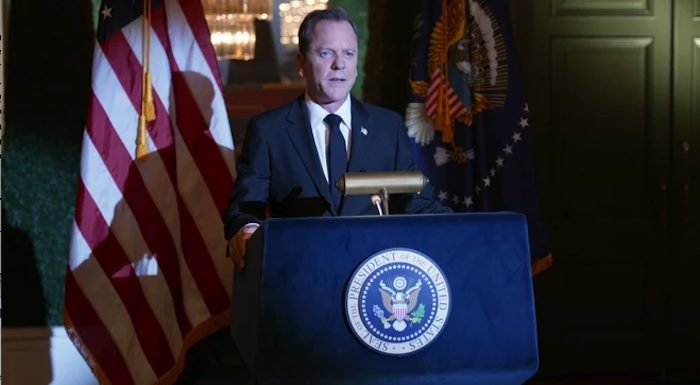Netflix UK TV review: Designated Survivor (Episode 2 to 5)
Review Overview
Believability
7Early mistakes
6Learning on the job
8David Farnor | On 10, Nov 2016
This review contains mild spoilers. Read on for full spoilers for Episodes 1 to 5, or read our spoiler-free review of Episode 1 here.
Before November 2016, if you said that any man without qualifications could suddenly become President of the United States, you’d either be called crazy, or you’d be talking about Kiefer Sutherland’s fictional thriller on ABC, Designated Survivor. With Donald Trump’s victory this week turning that show’s preposterous premise into something entirely plausible, the question is no longer whether you believe it could happen, but whether you prefer it to what’s actually happening.
Judging by its first, uneven episode, which saw Tom Kirkman (Sutherland) become the only surviving member of the USA’s Democrat Party, following a bomb attack during the President’s State of the Union address, the answer was a “maybe”. But somewhere along the line between Episode 1 and 5, Designated Survivor has gone from enjoyably bad to genuinely rather good – an unexpected, but far from unwelcome, surprise. And in the current age of political surprises, we’ll gladly take that.
The show quickly proves that it’s not interested in just giving us Jack Bauer as President – as fun as that thought might be – but is willing to dive into serious issues, such as racism, with a straight face. In no time at all, speechwriter Seth Wright (Kal Penn) has been stopped in the street by policemen, solely because of his skin colour. And, to cap it all off, Governor Royce of Michigan has decided to allow his police officers to round up all the Muslims in the state for ‘public safety’, refusing to recognise Kirkman’s authority as an unelected POTUS. These are all convincingly logical consequences of a terrorist strike in Washington. Even a visit to the charred remains of the Capitol building, which could have been a mawkish, heavy-handed moment, is undermined by the viral video of a policeman beating a Muslim spreading through people’s phones, just as Kirkman tries to deliver a rousing speech.
That only makes the more conventional Dramatic Moments stand out like sore thumbs, though; cringe at the clunkingly obvious dialogue in Episode 3, as Kirkman finds himself quizzed on TV about whether he was fired by the late President on the morning of his appointment as the new POTUS. Should he undermine his own authority by being honest, or should his first act as the President be a lie? Wince at the two-dimensional General Cochrane (Kevin R. McNally), who keeps barking orders to invade everywhere in the war room, while Kirkman tries to keep a lid on the drone strikes until they know for sure that a video claiming responsibility is genuine.
It’s these kind of Important Crossroads and Moral Decisions that Designated Survivor loves to throw at us – and fortunately, it’s when Sutherland is at his best, using his charisma (turned all the way up to, ahem, 24) to sell both Tom’s indecision and his sincerity. With little experience and even less gravitas, he’s not very good at the job, but we want him to be – a hard balance to get right. If anyone else were in the role, it’s hard to imagine the show working, not least because Kiefer’s had a lot of practice at staring dramatically off-camera, while looking exhausted.
Alas, even he can’t rescue the show from his dire family, which include a supportive wife, Alex (Natascha McElhone), and a son, Leo (Tanner Buchanan), who apparently deals drugs for no real reason. “The White House didn’t cause our problems,” says Alex, at one point. “We brought them with us.” Deep.
But just as you start to despair of the whole thing, Designated Survivor starts to make changes. Like Kirkman getting more confident in his unfamiliar role, the series learns on its feet.
Over several hours, it tones down the family soap opera in favour of a more complex narrative (that drugs subplot involving Leo disappears into thin air). Soon enough, Alex, who is a lawyer, begins to help out with the legal tussle between Tom and Royce, something that makes their domestic struggles feel far more relevant to the rest of the show (and gives McElhone more to do). Maggie Q’s FBI agent, Hannah Wells, who initially feels like part of a different programme, also becomes intertwined with everything else, as her investigations into the bombing lead her down a conspiracy path – a path that Kirkman inevitably becomes aware of. And Seth, who is prone to soul-searching conversations with Kirkman in the middle of the night, moves into his natural post as Press Secretary, which gives the likeable Penn a chance to be sarcastic and witty, as well as reinforce the show’s earnest tone.
Underpinning all these improvements is the very simple idea that the writers hit upon: Kirkman is not the only survivor. There is, naturally, a Designated Survivor for the GOP: Congresswoman Hookstraten (Virginia Madsen), who, as she essentially represents all of Congress, repeatedly pesters Tom to be kept in the loop of his executive orders, while undermining him at every opportunity. Madsen is wonderful, slimy and ambitious, but also oddly supportive of Tom, both in terms of the stability of the country, but also as a fellow survivor of the tragic attack. And then there’s Congressman Peter MacLeish (Ashley Zukerman), who was in the Capitol when the bomb went off but somehow stayed alive – a fact that turns him into a national hero (he’s an Afghan War veteran) and automatically makes him a candidate for the show’s equivalent of Homeland’s Brody.
There’s a nice layer of political intrigue that’s steadily built up, which the series manages to do both through Kirkman’s gradual gaining of experience and the slow assembly of his administration. At the heart of that are two key characters: the endearingly loyal Emily Rhodes (Italia Ricci), who was Tom’s former departmental Chief of Staff, and the slightly slippery Aaron (Adan Canto), the former White House Deputy Chief of Staff. Both want the top job of White House Chief of Staff, but Kirkman chooses Aaron. Why? Not because he’s more trustworthy, but less – a sign that both he and the show are willing to embrace some back-stabbing and double-crossing to get things done. That’s a promising cue for Sutherland to start introducing more sides to his lead too, dealing with the Royce situation by deceiving him not once but twice – by the time we reach the end of the fifth episode, and military action is on the cards in response to the Capitol attack, he’s far from the honest, good man that went unwittingly into power. And Sutherland’s smirk suggests that he’s starting to like it – Emily, luckily, is on hand as his disapproving conscience to counter that shift. Combined with her own cutthroat edge, which sees her leave the confines of the White House corridors to tackle Royce head-on, and her increasingly flirty banter with Aaron, even she gets a hint of a character arc – just enough to add shades to an overall picture that otherwise might have been cartoonish.
The result is an ensemble thriller that feels increasingly sure-footed in a way that suits its blossoming President – a burgeoning confidence that easily wins your vote. Alternating between Sutherland’s weary sighs and his eventual overcoming of obstacles, the show falls into a cycle that makes for satisfying viewing. After all, it’s more enjoyable than what’s actually going on with the White House.
Designated Survivor is available on Netflix UK, as part of an £9.99 monthly subscription. New episodes arrive every Thursday, within 24 hours of their US premiere.
Ballot papers and bills (spoilers)
– “When a snake’s in your kitchen, you don’t invite it to dinner,” says General Cochrane in Episode 3. “You cut off its head.” Just when you think these conversations are about to get very repetitive, Kirkman spins around and fires him on the spot. Nice one, Mr. President.
– Majid Nassar is the terrorist who claims responsibility for the attack on the Capitol, but it’s all very conveniently timed for the White House to name a suspect and whip up support from the American public. Nonetheless, experts confirm his location in Algeria and Tom dispatches a Navy SEAL mission to capture him. The grunts are all cardboard cut-out military types, which stops us being concerned about the death of their leader, who gets shot protecting a child hostage. At least it justifies Kirkman’s nerves about the whole thing; he seems more worried about his troops being safe than getting their man. Bless his incompetent socks.
– Let’s talk about Hookstraten. Madsen is fast becoming the best thing on the show, stealing scenes with catty glances, carefully laid plans and eager insurbordination. Discovery the SEAL operation, she threatens to expose him if it goes wrong, all the while smiling sweetly at Seth and the others. Her underlying nastiness pokes through with wonderful little outbursts. “Coming, Peter?” she barks at MacLeish as she leaves a meeting in the Oval Office, like he’s her pet dog. Maybe he is? She even meets Wells to stay up-to-date with any FBI leads on the attack. Make no mistake: she’s a dangerous type and may well end up being a major villain.
– So how did MacLeish survive? Wells’ trip to him and his wife only uncovers a story about her repeatedly calling him during the State of the Union about their child, which is why he stepped out and was absent during the explosion – but the pair deliver it with such a polished, rehearsed air that we don’t know what to believe.
– It’s later that Hannah discovers from the architect behind the Capitol building, courtesy of a mysterious late-night phone call from an anonymous source (is there any other kind?) that she needs to find Room 105. It’s not on the blueprints for the property. Why? Because it’s a secret bombproof bunker – so who had that built, who knew about it, and what were they planning?
– Let’s talk Alex, whom we discover at the end of Episode 5 that she has a former relationship with a guy that “Tom knows about”. What he doesn’t know about, though, is that Leo may belong the other fellow, rather than him. Get out the Jerry Springer lie detector kit: this paternity subplot could be some properly soapy stuff. But rather than before, where Tom’s family felt like token add-ons, Alex now owes Hookstraten a favour, after her help with a family facing deportation, which makes things far more interesting…





















